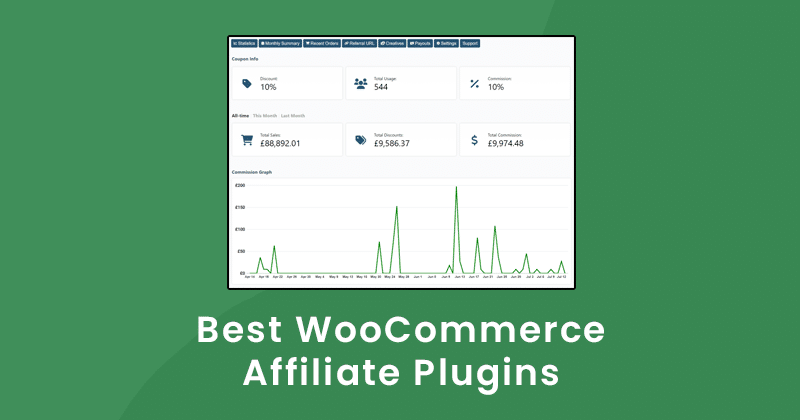12 Arten von Affiliates, die Sie zu Ihrem Partnerprogramm einladen können
Wenn Sie die verschiedenen Arten von Partnern kennen, können Sie Ihre Rekrutierungsbemühungen so gestalten, dass Sie hochwertige Partner für Ihr Programm gewinnen.
Bei der Zusammenarbeit mit der richtigen Mischung von Partnern geht es nicht nur darum, die Reichweite zu erhöhen, sondern auch darum, sich mit Menschen und Unternehmen zusammenzuschließen, die bereits Einfluss auf Ihren Zielkunden haben.
Die Qualität und Quantität der Partner, mit denen Sie zusammenarbeiten, kann Ihre Ergebnisse bestimmen oder brechen. Um Ihr Partnerprogramm zu skalieren, müssen Sie sich strategisch überlegen, welche Arten von Partnern mehr Geld einbringen beständiger, qualifizierter Verkehr Monat für Monat.
In diesem Beitrag erörtern wir die wichtigsten Arten von Affiliates, mit denen es sich lohnt, eine Partnerschaft einzugehen, was sie wertvoll macht und wie man rekrutiert und unterstützen Sie diese effektiv, damit Sie nicht nur Klicks, sondern qualifizierten Traffic und Verkäufe erhalten.
Dann fangen wir mal an.
Arten von Tochtergesellschaften
Hier finden Sie elf verschiedene Arten von Partnerunternehmen im Überblick. Lesen Sie weiter, um einen detaillierten Überblick über die einzelnen Arten zu erhalten.
- Ersteller von Blog-Inhalten.
- YouTuber.
- Twitch-Streamer
- Coupon-Seiten.
- E-Mail-Newsletter.
- Nischen-Influencer in sozialen Medien (Instagram, TikTok usw.).
- Bewertungs- und Vergleichsseiten.
- Gemeinschaften und Nischenforen.
- Komplementäre Geschäfte.
- Autoren des Kurses.
- Anbieter von Dienstleistungen.
- Produktevangelisten und Superfans.
Ersteller von Blog-Inhalten
Blogger und Influencer sind die OG-Affiliates. Sie veröffentlichen lange Inhalte wie Produktbewertungen, Kaufanleitungen, Anleitungen, Vergleiche, Listen usw. auf ihren eigenen Websites mit dem Ziel, bei Suchmaschinen wie Google gut abzuschneiden.
Blog-Inhalte werden oft organisch von Menschen entdeckt, die nach bestimmten Problemen oder Produktlösungen suchen. Daher eignen sie sich hervorragend für Produkte mit klaren Anwendungsfällen in Nischen mit starkem Suchinteresse (z. B. Gesundheit, Fitness, Haushalt, Technik, Mode).
So finden Sie diese Art von Partnerunternehmen
- Führen Sie eine Google-Suche nach "[Ihr Produkttyp] Blog" oder "[Ihre Nische] Bewertungen" durch.
- Verwenden Sie Tools wie Ahrefs oder SEMrush, um hochrangige Blogs zu identifizieren, die bereits Inhalte zu Ihren Produkten veröffentlichen.
YouTuber
Videos sind nachweislich effektiver sind als das geschriebene Wort, vor allem, wenn sie eine reale Person zeigen. YouTube-Filialen Erstellung von Videoinhalten, in denen Produkte vorgestellt werden, wie sie verpackt werden, wie sie erklärt werden, Vergleiche, Vor- und Nachteile, Meinungen usw.
Videos eignen sich am besten für digitale und physische Produkte, die von Demos profitieren, z. B. Software, hochwertige und lifestyle-orientierte Produkte.
So finden Sie diese Art von Partnerunternehmen
- Führen Sie eine YouTube-Suche nach Begriffen durch, die mit Ihren Produkten und Ihrer Branche zusammenhängen.
- Quellenersteller, die auf Plattformen wie Influence.co oder Collabstr Affiliate-Deals annehmen.
Twitch-Streamer
Twitch-Streamer veranstalten Live-Übertragungen, hauptsächlich zu Spielen, aber auch zu Themen wie Fitness oder Kochen. Sie ziehen Zuschauer an, die in Echtzeit chatten und interagieren. Diese Partner werben für Produkte, indem sie sie während der Streams zeigen, Links im Chat teilen oder Live-Demos geben.
Live-Streams schaffen starke Bindungen zu den Fans, die den Ansichten des Streamers vertrauen. Dies führt zu schnellen Käufen, da die Zuschauer an Ort und Stelle Fragen stellen können. Twitch-Mitglieder eignen sich gut für Gaming-Ausrüstung, technische Artikel, Energy Drinks und Stühle, die Streamer live vorführen können.
So finden Sie diese Art von Partnerunternehmen
Suchen Sie auf Twitch nach Streams in Ihrer Nische. Verwenden Sie Tools wie TwitchTracker um Schöpfer mit guten Zuschauerzahlen und Chat-Aktivitäten zu erkennen.
Coupon-Seiten
Websites mit Sonderangeboten und Coupons sind dafür bekannt, dass sie besonders gut konvertieren, vor allem, weil sie genau dann angezeigt werden, wenn der Kunde entscheidet, ob er einen Kauf tätigt oder nicht.
Sie rangieren oft für markenbezogene Suchanfragen wie "Markenname" + "Rabattcode" oder "Markenname" + "Promo-Code". Gutschein-Websites sind großartige Partner für Kampagnen zur Kundengewinnung, z. B. saisonale Sonderangebote, Rabatte für Erstbesteller oder Blitzverkäufe.
Es ist jedoch wichtig, dass Sie sicherstellen, dass tatsächliche Partner-Nutzer ihre eigenen Empfehlungscodes nicht auf Gutschein-Websites veröffentlichen. Machen Sie in Ihren Allgemeinen Geschäftsbedingungen deutlich, dass dies nicht erlaubt ist.
So finden Sie diese Art von Partnerunternehmen
- Führen Sie eine Google-Suche nach Ihrem "Markennamen" + "Rabattcode", "Markenname" + "Promo-Code", "Markenname der Konkurrenz" + "Rabattcode" oder "Markenname der Konkurrenz" + "Promo-Code" durch.
E-Mail-Newsletter
Es gibt ganze Unternehmen, die sich auf die Verteilung von Newslettern per E-Mail spezialisiert haben, und zwar in den unterschiedlichsten Branchen, von Mode über Wellness und Kindererziehung bis hin zu Produktivität und Technik.
Der E-Mail-Kanal ist äußerst effektiv und persönlich. Wenn die Herausgeber von Newslettern also relevante Produkte empfehlen, in Form von Geschenkanleitungen, kuratierten Listen oder sogar Anzeigen usw., betrachten die Leser ihre Empfehlungen als vertrauenswürdige Tipps und nicht als willkürliche Anpreisungen.
Profi-Tipp: Kunden, die über E-Mail-Newsletter akquiriert werden, suchen in der Regel nicht aktiv nach Ihren Produkten, so dass ihr Kaufprozess tendenziell länger ist als bei Kunden, die über Blogs, YouTuber und Gutschein-Websites gewonnen werden. Aus diesem Grund positionieren Sie Ihr Unternehmen als vertrauenswürdige Instanz, wenn Sie Inhalte veröffentlichen, die die Entstehungsgeschichte Ihrer Marke, Ihre Mission, Ihre Vision oder Ihr Fachwissen vermitteln.
So finden Sie diese Art von Partnerunternehmen
- Führen Sie eine Google-Suche nach Ihrer "Branche" + "Newsletter" und "Top-Stimmen in Branche X" durch.
Nischenanbieter für soziale Medien (Instagram, X, TikTok usw.)
Schöpfer, die häufig in den sozialen Medien über bestimmte Themen posten, wie z. B. Hautpflege, Veganismus, Indoor-Pflanzenerziehung, Streetwear-Drops, DIY-Handwerk usw., haben in der Regel enge Beziehungen zu ihren Gemeinschaften.
Auch wenn sie keine große Reichweite haben, sind sie den "Makro"-Influencern oft überlegen, weil ihre Inhalte persönlicher wirken. Das bedeutet, dass sie ein Publikum erreichen, das in der Regel loyal, engagiert und sehr empfänglich für ihre Produktempfehlungen ist.
So finden Sie diese Art von Partnerunternehmen
- Führen Sie eine Suche auf der Social-Media-Plattform Ihrer Wahl durch, um Kreative in Ihrer Branche mit einem sehr engagierten Publikum zu finden. Nehmen Sie dann Kontakt mit ihnen auf und bieten Sie ihnen Affiliate-Links sowie Boni wie kostenlose Produkte, exklusive Rabatte, neue Produkteinführungen, spezielle Pakete usw. an.
Bewertungs- und Vergleichsseiten
Review-Websites sind spezialisiert auf Seite-an-Seite-Vergleiche, ausführliche Produktbewertungen und kuratierte "Best-of"-Listen für bestimmte Branchen.
Sie fangen High-Intent-Traffic ein, indem sie Inhalte veröffentlichen, die auf Käufer abzielen, die sich mitten im Entscheidungsprozess befinden und bereit sind zu kaufen. Wenn Ihr Produkt in diesen Inhalten gut dargestellt und positioniert ist, kann es den Verkauf gewinnen.
Bewertungs- und Vergleichsseiten eignen sich am besten für physische oder digitale Produkte, die in Nischen, in denen die Käufer dazu neigen, vor einer Kaufentscheidung viel zu recherchieren, mit anderen Produkten konkurrieren.
Wie man mit dieser Art von Partnerunternehmen arbeitet
- Erstellen Sie überzeugende Argumente, warum Ihre Produkte es verdienen, in die Listen aufgenommen zu werden. Heben Sie Ihre Bewertungen, Preise, Versandbedingungen und Alleinstellungsmerkmale hervor und bieten Sie bei Bedarf Produktproben oder Zugang zu Ihren Produkten an.
Gemeinschaften und Nischenforen
Es gibt verschiedene Online-Communities, die von Moderatoren oder Admins geleitet werden und sich an Menschen mit Interessen richten, die mit Ihren Produkten in Zusammenhang stehen. Zu dieser Kategorie gehören Facebook-Gruppen, Slack-Arbeitsbereiche, Reddit-Untergruppen, Discord-Server und private Foren.
Empfehlungen von angesehenen Mitgliedern oder Verwaltern können den Verkauf ankurbeln, insbesondere wenn Sie exklusive Rabatte oder Pakete nur für Mitglieder anbieten.
Wie man mit dieser Art von Partnerunternehmen arbeitet
- Treten Sie jedem Forum bei, um ein Gefühl für die Gemeinschaft zu bekommen. Wenden Sie sich dann privat an die Moderatoren oder Ersteller und bieten Sie eine individuelle Landing Page, gruppenspezifische Boni oder Werbegeschenke an, um das Interesse zu wecken.
Komplementäre Geschäfte
Unternehmen, die dieselbe oder eine ähnliche Zielgruppe wie Sie bedienen, aber keine Konkurrenten sind, eignen sich hervorragend als Partner, da sie Ihren Markt bereits kennen und erreichen können.
Deren Kunden benötigen Ihr Produkt wahrscheinlich als "nächsten Schritt" oder als verwandte Lösung, so dass eine Partnerschaft mit ihnen für ihr und Ihr Unternehmen von Vorteil ist.
So aktivieren Sie diese Art von Partnerunternehmen
- Identifizieren Sie nicht konkurrierende Unternehmen, die bei Ihrer Zielgruppe beliebt sind, und bieten Sie gemeinsame Werbeaktionen oder gebündelte Angebote an, die die Erfahrung ihrer Kunden verbessern.
Autoren des Kurses
Die besten Kursersteller verkaufen Online-Kurse, veranstalten Workshops oder betreiben Mitglieder-Communities. Im Laufe der Zeit haben sie tiefe Beziehungen zu einem Publikum aufgebaut, das sie als vertrauenswürdige Experten auf ihrem Gebiet betrachtet.
Studenten brauchen oft Werkzeuge, Produkte oder Vorlagen, um das Gelernte umzusetzen.
Kursersteller sind in erster Linie Pädagogen und erst in zweiter Linie Vermarkter, was bedeutet, dass jedes Produkt, für das sie werben, mit ihrer Glaubwürdigkeit übereinstimmen muss. Wenn Sie nachweisen können, wie Ihre Produkte den Schülern zum Erfolg verhelfen, werden viele Kursersteller sie gerne in ihren Lehrplan aufnehmen. Austausch gegen eine Provision.
So aktivieren Sie diese Art von Partnerunternehmen
- Sprechen Sie Ihre Kunden direkt oder über Partner-Netzwerke an. Bieten Sie eine verlängerte Testphase, einen Demo-Zugang oder Lizenzschlüssel an, damit sie mit Zuversicht testen und unterrichten können.
Anbieter von Dienstleistungen
Dienstleister sind Fachleute oder Agenturen, die direkt mit Ihren Zielkunden zusammenarbeiten, z. B. Berater, Designer, Agenturen, Vermarkter, Freiberufler, Entwickler, Coaches usw.
Die Kunden zahlen für ihre Beratung und Unterstützung, so dass ihre Empfehlungen einen echten Einfluss auf die Kaufentscheidungen haben. Wenn Ihr Produkt die Ergebnisse Ihrer Kunden verbessert, können Sie sie überzeugen, es zu empfehlen.
So aktivieren Sie diese Art von Partnerunternehmen
- Heben Sie Erfolgsgeschichten von Kunden hervor, die sie in ihren Angeboten verwenden können.
- Angebot Unterstützung bei der Einarbeitung, Schulung, White-Label-Optionen, Mengenrabatte oder co-branded Ressourcen.
Produktevangelisten und Superfans
Kunden, die bei Ihrem Unternehmen gekauft haben und Ihre Produkte lieben, sind wahrscheinlich die besten Partner. Die Chancen stehen gut, dass sie Ihre Marke bereits in Instagram-Stories, Tweets, Blogbeiträgen oder in lockeren Gesprächen erwähnt haben.
Empfehlungen von begeisterten Kunden funktionieren, weil sie auf authentischen Erfahrungen beruhen, so dass sie sich nicht wie Werbung anfühlen. Und ihr Publikum, ob klein oder groß, kann das spüren.
So aktivieren Sie diese Art von Partnerunternehmen
- Sprechen Sie frühere Kunden an und laden Sie sie zu Ihr Partnerprogramm. Stellen Sie Top-Produkt-Evangelisten in Ihren Newslettern oder Community-Bereichen vor, damit sie sich als Teil der Marke fühlen.
Sind Sie bereit, mit verschiedenen Arten von Partnern zu arbeiten?
Wenn Sie darüber nachdenken, mit welchen Arten von Partnern Sie zusammenarbeiten möchten, sollten Sie sich überlegen, wer Ihre Zielgruppe bereits bedient, und sich fragen, wie Sie es ihnen schmackhaft machen können, Ihnen Aufträge zukommen zu lassen.
Sie brauchen nicht Hunderte von Partnern, Sie brauchen die richtigen.
Identifizieren Sie zunächst drei bis fünf Arten von Partnern, die zu Ihrem Produkt, Ihrer Gewinnspanne und Ihren Zielkunden passen. Setzen Sie dann auf den Aufbau echter Beziehungen: Geben Sie Ihren Partnern die Werkzeuge, Mittel und Anreize, um erfolgreich zu sein.
Im Laufe der Zeit bauen Sie ein solides Netzwerk von Partnern auf, die als Fürsprecher der Marke fungieren und jeden Monat qualifizierten Traffic einbringen.
PS: Möchten Sie Ihr eigenes Partnerprogramm erstellen? Sehen Sie sich unser Plugin an, Coupon-Affiliates. Seit 2019 haben Tausende von Websites, darunter E-Commerce-Shops, E-Learning- und Mitgliedschaftsseiten, das Programm genutzt, um erfolgreiche Partnerprogramme zu erstellen. Viele Kunden sagen, es sei die bestes Affiliate-Marketing-Plugin. Holen Sie sich die 100% kostenlose Version, oder starten Sie Ihr 7 Tage kostenlose Testversion mit der PRO-Version.
Priyanka ist Autorin für WordPress- und eCommerce-Unternehmen. Sie liebt es, komplexe Ideen in einfache Konzepte zu zerlegen.




Schreibe einen Kommentar